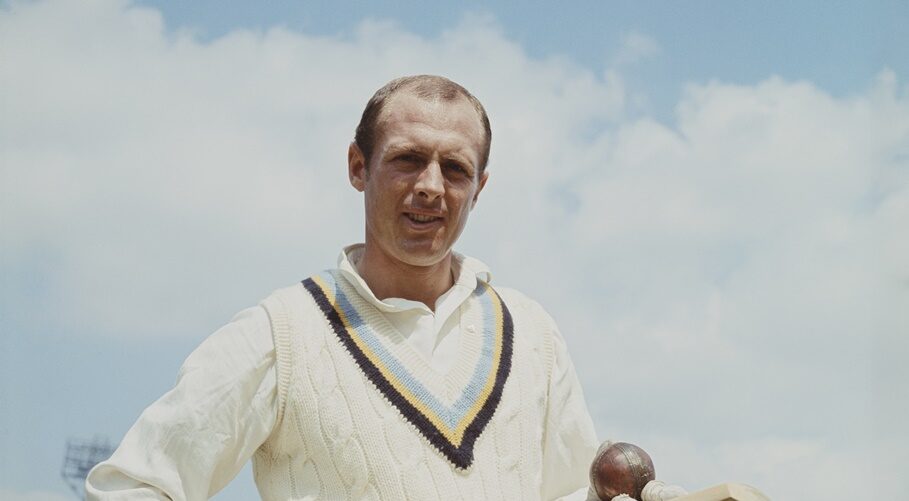(Photo by Don Morley/Getty Images)
By Peter Hayter
Jonathan Agnew freely admits that, when it came to facing the quicks, he wasn’t the bravest.
But the BBC’s cricket correspondent showed courage above and beyond the call last week when he wound up fellow commentator Geoffrey Boycott on Test Match Special regarding the Yorkshireman’s ‘phantom’ first-class century.
Over the years, Boycott has had to endure a multitude of challenges off the field, not least the threat to his life posed by cancer and a conviction and suspended sentence from a French court for assault, which he strenuously denied, and has always inspired as much criticism as admiration.
But nothing is more likely to cause him discomfort than the mere suggestion that he was not among the greatest batsmen English cricket has ever produced, so the prank of trying to rule out one of his 151 first-class centuries, thus making a non-event of next week’s celebration of the 40th anniversary of his 100th hundred, scored at Headingley of course, might very well have ended in tears, or worse.
On hearing Agnew reading out the ICC ‘press release’ that explained England’s match against a Rest Of The World XI at Lord’s in 1970, in which Boycott made 157, was ‘no longer considered a first-class match’, Boycs replied, “That’s a load of tripe. Whoever was behind that decision must be an idiot.” But, to the widespread relief of those inside and outside the TMS box listening, when informed he had been done like a kipper, he had the grace to take the joke on the chin.
T’was not ever thus, for batting is not now, nor ever has been a laughing matter for the 76-year-old from Fitzwilliam in the West Riding of Yorkshire, his single-minded pursuit of run-scoring drawing accusations of selfishness that dogged him throughout his career and beyond.
And for all those supporters who will see what happened in Leeds 40 years ago next week as ample justification of his blinkered approach to batting, as many detractors will point to what happened at Trent Bridge 40 years ago last week to support their claim that his self-centredness made him less of a player than he might have been.
The arguments rage on about the only England batsman ever to be dropped for slow scoring, and this after making what turned out to be his highest Test innings of 246 not out against India at Headingley in 1967, but the specific facts of these 40-year-old events bear retelling.
The third Test of the 1977 Ashes series in Nottingham, played from July 28 to August 2, later made famous for being the Test debut of Ian Botham, was also a landmark occasion for two other England cricketers; Boycott, who was returning to the fold after three years of a self-imposed exile, the reasons for which he has never fully explained, and Derek Randall, playing a Test match in front of his adoring Trent Bridge crowd for the first time.
In March, the engaging ‘Arkle’ had been the star of the Centenary Test match in Melbourne, a joyous celebration of 100 years of Ashes cricket, thrilling the packed house with a quite brilliant 174 on his debut against Australia, including a hooked four off Dennis Lillee which I can still see now, and an acrobatic tumble to avoid the great bowler’s wrathful bouncer which ended with the Nottinghamshire entertainer rising to his feet and doffing his cap to his even more enraged opponent.
Now, back home, Randall had made just 13 and England, in response to Australia’s first innings 243, were 52-2 when Boycott pushed a full delivery from Jeff Thomson back towards him at the non-striker’s end and set off for a quick single.
Before he had reached halfway and Randall, whose path was blocked by Thomson following through, had even set off, the bowler picked up the ball and flicked it to wicket-keeper Rod Marsh.
Boycott never broke stride. Randall, stranded, was run out by most of the length of the pitch. The reaction of the crowd was a mixture of stunned silence and random booing.
On commentary, the BBC’s John Arlott summed up the mood: “How tragic, how tragic, how tragic.”
Those convinced that Boycott was not interested in anyone or anything but his own batting have often used this as evidence to support their case.
Former Aussie skipper Ian Chappell remains in no doubt: “The reason I don’t put Geoffrey Boycott in the class of great is because he was a selfish b**tard. He only played for himself; he didn’t play for his team. Garry Sobers averaged 58 and he played every second for the game of cricket, not for Garry Sobers, and Boycott played every second of his career for himself and he only averaged 48.”
His brother Greg often told what his critics regarded as the most telling of all the Boycott tales: England, Down Under, were troubled by their mystery spinner John Gleeson. Basil D’Oliveira was out in the middle with Boycott when he finally began to fathom out Gleeson’s action.
He went down to the other end to tell his partner how he’d finally picked it.
“I worked it out in the second Test,” Boycott replied. “But don’t tell those buggers in the dressing room.”
It is not only some Aussies who never had a good word to say about Boycott. Try this from fellow Tyke, Brian Close:
“A selfish man – he came first, second and third.” Ray Illingworth and Don Wilson were hardly his greatest fans either and while his sacking as Yorkshire captain led to great bitterness, the club insisted that, by his actions, he had made the decision for them.

Geoffrey Boycott sweeps the ball away to break the record number of Test runs against India in 1981 (photo: Adrian Murrell/Allsport UK)
While grateful for his runs, on occasions his England team-mates were driven to distraction by the pace at which he made them, never more so than in the second Test against New Zealand in Christchurch in February 1978 when the young Botham was sent out with instructions from the senior players to run their skipper out.
Pretty damning stuff. Then again, Boycott’s supporters will point to what happened during the rest of that summer of ’77, post the Randall run-out, as proof that their man was always much maligned.
At Trent Bridge he batted on all five days, made 107 in the first innings from 315 balls and 80 not out in the second from 231, and at the end, walked off arm in arm with Randall, “The run out completely forgotten,” according to Wisden.
At Headingley, to the delight of his Yorkshire public, and a ten-minute delay while they settled down again afterwards, he duly drove Greg Chappell to the long-on boundary to became the first player to make his 100th hundred in a Test match, with TV pictures showing Randall, on the dressing room balcony, barely able to contain his delight.
Boycott went on to make 191 there, in both instances his batting was the platform upon which England built crushing victories and he ended the series with 442 runs at an average of 147.33 and England 3-0 winners.
The great Brian Johnston, once entered these observations into the Boycott debate and, as we started with the TMS team, why not let him have the last word (for now)?
According to Johnners: “I said to him: ‘You know, I don’t consider you to be a complete batsman because you don’t take an attack by storm’. And he said: ‘Well, no. You see I am the best batsman in the side so I must not take risks. The others must’. He was quite straightforward about it.
“I asked about the run outs and he said: ‘I mustn’t be the one run out.
The other people have got to make the sacrifices’. He quite genuinely believed it.
“He would have been the best professional golfer there’s ever been. He could have played for himself and not run anyone out.”















